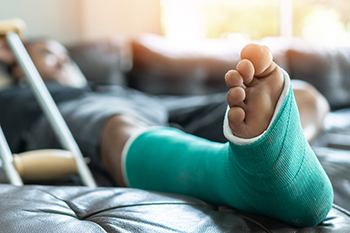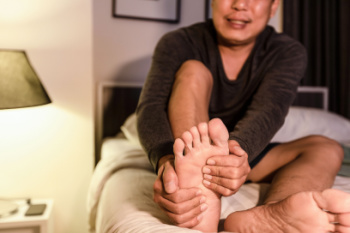Items filtered by date: August 2025
Life After an Ankle Fracture

Healing from an ankle fracture does not end when the cast or boot comes off. This stage is when the real work begins. The ankle may feel stiff, weak, or unsteady, and it takes patience to restore full strength and movement. Gentle exercises help improve flexibility and prevent the joint from becoming rigid. Wearing supportive footwear can make walking safer and more comfortable, while avoiding uneven surfaces reduces the risk of another injury. Swelling can linger for weeks, so elevating the foot and using cold therapy may still be helpful. Some people benefit from targeted exercises to rebuild balance and coordination. Listening to the body and progressing slowly allows the ankle to recover without unnecessary setbacks. Careful attention during this period supports long term mobility and helps prevent future problems. If you need help with recovery or it stalls, it is suggested that you see a podiatrist for expert advice.
Broken ankles need immediate treatment. If you are seeking treatment, contact Adam Klein, DPM from Lynbrook, NY. Our practitioner can provide the care you need to keep you pain-free and on your feet.
Broken Ankles
A broken ankle is experienced when a person fractures their tibia or fibula in the lower leg and ankle area. Both of these bones are attached at the bottom of the leg and combine to form what we know to be our ankle.
When a physician is referring to a break of the ankle, he or she is usually referring to a break in the area where the tibia and fibula are joined to create our ankle joint. Ankles are more prone to fractures because the ankle is an area that suffers a lot of pressure and stress. There are some obvious signs when a person experiences a fractured ankle, and the following symptoms may be present.
Symptoms of a Fractured Ankle
- Excessive pain when the area is touched or when any pressure is placed on the ankle
- Swelling around the area
- Bruising of the area
- Area appears to be deformed
If you suspect an ankle fracture, it is recommended to seek treatment as soon as possible. The sooner you have your podiatrist diagnose the fracture, the quicker you’ll be on the way towards recovery.
If you have any questions, please feel free to contact our office located in Contact Us . We offer the newest diagnostic and treatment technologies for all your foot care needs.
Common Soccer Foot and Ankle Injuries

Soccer places significant demands on the feet and ankles, making certain injuries more frequent among players. Ankle sprains are common when the foot twists or rolls during quick changes in direction, often leading to swelling and difficulty in bearing weight. Plantar fasciitis can develop from overuse, with heel pain that worsens after activity or first thing in the morning. Stress fractures may occur from repetitive impact, creating localized pain that increases with play and improves with rest. Each of these conditions can limit performance and may worsen without timely care. Proper warm-up, supportive footwear, and gradual training progression help reduce the risk, but even experienced athletes are not immune. If you notice persistent pain, swelling, or difficulty walking after soccer activity, it is suggested that you consult a podiatrist for an accurate diagnosis and appropriate treatment.
Sports related foot and ankle injuries require proper treatment before players can go back to their regular routines. For more information, contact Adam Klein, DPM of Lynbrook, NY. Our practitioner can provide the care you need to keep you pain-free and on your feet.
Sports Related Foot and Ankle Injuries
Foot and ankle injuries are a common occurrence when it comes to athletes of any sport. While many athletes dismiss the initial aches and pains, the truth is that ignoring potential foot and ankle injuries can lead to serious problems. As athletes continue to place pressure and strain the area further, a mild injury can turn into something as serious as a rupture and may lead to a permanent disability. There are many factors that contribute to sports related foot and ankle injuries, which include failure to warm up properly, not providing support or wearing bad footwear. Common injuries and conditions athletes face, including:
- Plantar Fasciitis
- Achilles Tendinitis
- Achilles Tendon Rupture
- Ankle Sprains
Sports related injuries are commonly treated using the RICE method. This includes rest, applying ice to the injured area, compression and elevating the ankle. More serious sprains and injuries may require surgery, which could include arthroscopic and reconstructive surgery. Rehabilitation and therapy may also be required in order to get any recovering athlete to become fully functional again. Any unusual aches and pains an athlete sustains must be evaluated by a licensed, reputable medical professional.
If you have any questions please contact our office located in Contact Us . We offer the newest diagnostic and treatment technologies for all your foot and ankle needs.
Wearing Ill-Fitting Shoes Can Affect Your Toes

Wearing shoes that do not fit properly can put stress on the toes, leading to a range of foot problems. Shoes that are too tight in the toe box may crowd the toes, which can result in corns, calluses, and painful nerve conditions like neuromas. High heels or shoes that elevate the heel significantly can increase pressure on the forefoot, shifting weight onto the toes and altering foot alignment. Over time, this can cause or worsen deformities like hammertoes or bunions. Shoes that are too loose may allow the foot to slide forward, creating friction that can irritate the toes and lead to blisters or toenail damage. A podiatrist can evaluate your foot structure, check for existing damage, and recommend proper footwear or custom orthotics to relieve pressure and prevent further injury. If you are experiencing toe or foot pain, it is suggested that you schedule an appointment with a podiatrist for an exam and treatment options.
Getting the right shoe size is an important part of proper foot health. Seek the assistance of Adam Klein, DPM from Lynbrook, NY. Our practitioner will provide the care you need to keep you pain-free and on your feet.
Getting the Right Shoe Size
There are many people who wear shoes that are the incorrect size, negatively affecting their feet and posture. Selecting the right shoes is not a difficult process, so long as you keep several things in mind when it comes to choosing the right pair.
- When visiting the shoe store, use the tools available to measure your foot.
- Be sure there is ‘wiggle room’. There should be about an inch between your toes and the tip of your shoes.
- Do not always assume you are the same size, as manufacturers run differently.
- Purchase shoes later in the day, as your feet swell as the day progresses.
- If a shoe is not comfortable, it is not suitable. Most shoes can’t be ‘broken in’, and comfort should be the ultimate goal when it comes to choosing the right pair of shoes
As our feet hold our body weight and keep us moving, it is important to treat them right. Picking the right pair of shoes can provide your feet comfort and mobility without pain.
If you have any questions, please feel free to contact our office located in Contact Us . We offer the newest diagnostic and treatment technologies for all your foot care needs.
How Rheumatoid Arthritis Can Affect Nerves in Your Feet

Rheumatoid arthritis is known for causing joint pain and inflammation, but it can also lead to nerve damage. Chronic swelling in the joints may compress nearby nerves, especially in the feet and ankles. This pressure can cause symptoms like tingling, numbness, burning sensations, or shooting pains, similar to peripheral neuropathy. Inflammation from rheumatoid arthritis may also directly damage nerves over time, interfering with how signals travel between your feet and brain. This can lead to changes in balance, walking difficulties, and sensitivity to touch. Treatment focuses on reducing inflammation and protecting joint and nerve health through medications, and wearing supportive footwear. If nerve-related symptoms begin or worsen, it is suggested you see a podiatrist for a thorough evaluation and personalized care plan.
Neuropathy
Neuropathy can be a potentially serious condition, especially if it is left undiagnosed. If you have any concerns that you may be experiencing nerve loss in your feet, consult with Adam Klein, DPM from Lynbrook, NY. Our practitioner will assess your condition and provide you with quality foot and ankle treatment for neuropathy.
What Is Neuropathy?
Neuropathy is a condition that leads to damage to the nerves in the body. Peripheral neuropathy, or neuropathy that affects your peripheral nervous system, usually occurs in the feet. Neuropathy can be triggered by a number of different causes. Such causes include diabetes, infections, cancers, disorders, and toxic substances.
Symptoms of Neuropathy Include:
- Numbness
- Sensation loss
- Prickling and tingling sensations
- Throbbing, freezing, burning pains
- Muscle weakness
Those with diabetes are at serious risk due to being unable to feel an ulcer on their feet. Diabetics usually also suffer from poor blood circulation. This can lead to the wound not healing, infections occurring, and the limb may have to be amputated.
Treatment
To treat neuropathy in the foot, podiatrists will first diagnose the cause of the neuropathy. Figuring out the underlying cause of the neuropathy will allow the podiatrist to prescribe the best treatment, whether it be caused by diabetes, toxic substance exposure, infection, etc. If the nerve has not died, then it’s possible that sensation may be able to return to the foot.
Pain medication may be issued for pain. Electrical nerve stimulation can be used to stimulate nerves. If the neuropathy is caused from pressure on the nerves, then surgery may be necessary.
If you have any questions, please feel free to contact our office located in Contact Us . We offer the newest diagnostic and treatment technologies for all your foot care needs.
